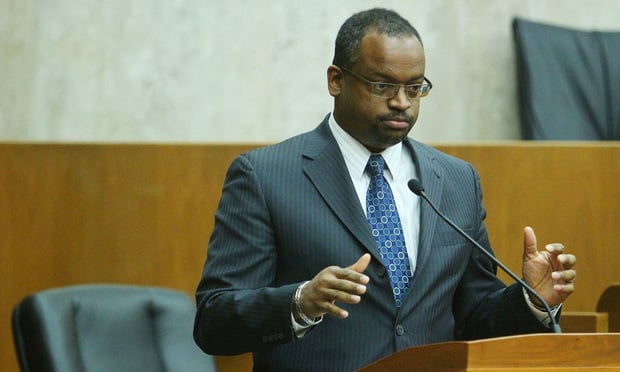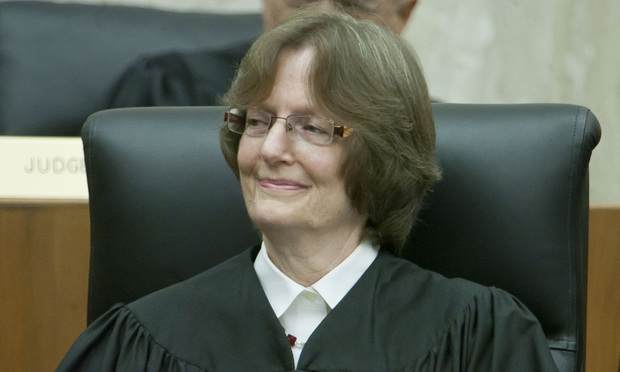DC Circuit Didn't Sound Eager to Force Dismissal of Case Against Michael Flynn
"I don't see why we don't observe regular order and allow him to rule," Judge Karen LeCraft Henderson said at one point during Friday's hearing in the D.C. Circuit. Flynn's lawyer, Sidney Powell, argued there was no longer any case or controversy, and the trial judge must dismiss the case against Flynn, at the request of the Trump Justice Department.
June 12, 2020 at 11:23 AM
7 minute read
 Judge Robert Wilkins of the District of Columbia Circuit. (Photo: Diego M. Radzinschi / ALM)
Judge Robert Wilkins of the District of Columbia Circuit. (Photo: Diego M. Radzinschi / ALM)
A federal appeals court appeared unwilling Friday to order the immediate dismissal of the case against Michael Flynn, displaying skepticism of the former Trump national security adviser's argument that a judge overstepped his authority when he appointed an outside lawyer to oppose the Justice Department's abandonment of the prosecution.
At the nearly two-hour hearing, Flynn's lawyer and an attorney for the Justice Department faced sharp questioning from a panel of the U.S. Court of Appeals for the D.C. Circuit, whose inquiries suggested a reluctance to order U.S. District Judge Emmet Sullivan to halt his review of the government's extraordinary move to drop the case.
Flynn, who twice admitted to lying to the FBI before later trying to back out of his guilty plea, filed a petition in the D.C. Circuit last month after Sullivan declined to immediately approve the Justice Department's request to dismiss the case. Sullivan instead appointed a former federal judge in Brooklyn, John Gleeson, to review the Justice Department's move and also address whether Flynn committed perjury in the course of the court proceedings.
Gleeson earlier this week said the government's move to drop the case was a "gross abuse of prosecutorial power" designed to benefit a Trump ally.
On Friday, Judge Karen L. Henderson, a 30-year veteran of the D.C. Circuit, pushed back strongly against Flynn's bid to have the appeals court step in and order the dismissal of his prosecution.
 Judge Karen LeCraft Henderson, of the U.S. Court of Appeals for the District of Columbia Circuit. (Photo: Diego M. Radzinschi/ ALM)
Judge Karen LeCraft Henderson, of the U.S. Court of Appeals for the District of Columbia Circuit. (Photo: Diego M. Radzinschi/ ALM)Henderson said it would be a "drastic remedy" for the D.C. Circuit to bring a halt to Sullivan's review and order the case's dismissal. Calling Sullivan an "old hand" and "excellent trial judge," Henderson said Sullivan might still decide to dismiss the case.
"I don't see why we don't observe regular order and allow him to rule," Henderson said.
Henderson was joined on Friday's panel by Judges Robert Wilkins and Neomi Rao, a former top Trump administration official appointed to the appeals court last year. Wilkins, a former federal trial judge who rose to the D.C. Circuit in 2014, repeatedly questioned arguments raised by Flynn's lawyer, Sidney Powell, and a top Justice Department official advocating for the appeals court to cut Sullivan's review short.
Powell, characterizing Sullivan's review as an "impermissible intrusion," argued that the case against Flynn "cannot go on any longer."
"The judge has no authority to do anything further in the case," she said.
Flynn's appeal was backed by Jeffrey Wall, a top appellate lawyer for the U.S. Justice Department, who argued Friday that Sullivan has taken up an "intrusive process" that had raised "grave, stark separation of powers concerns."
When asked why "regular order" should not be followed, with Sullivan allowed to rule, Wall said, "We would say this is an extraordinary case. We're well past regular order."
"At a minimum," Wall asserted, the D.C. Circuit should intervene in a more limited fashion and prevent Sullivan from probing the Justice Department's motives in dropping the Flynn prosecution.
"That clearly should be off the table," he said.
Sullivan turned to Beth Wilkinson, a prominent Washington trial lawyer, to defend his process before the D.C. Circuit. Wilkinson, who previously represented Justice Brett Kavanaugh during his confirmation to the Supreme Court, sought on Friday to underscore that Sullivan has not yet determined whether to dismiss Flynn's case and has appointed Gleeson strictly to better understand the scope of his authority.
"The district court is not acting as a prosecutor, nor has [Sullivan] made up his mind about the pending issues," Wilkinson said. "He is considering the government's motion and receiving briefing from all of the parties. After hearing the arguments, Judge Sullivan will do what he's called on to do on a daily basis: He'll decide the motion."
Flynn's challenge has presented the D.C. Circuit with a fresh interbranch dispute in the Trump presidency, this time pitting the administration against the judiciary in a case that has raised novel questions about the role judges play in reviewing prosecutorial decisions.
In the buildup to Friday's blockbuster argument, Republican and Democratic politicians weighed in on Flynn's case, dividing over the propriety of Sullivan's reluctance to immediately dismiss the prosecution at the request of the Justice Department. With a nod to the Trump administration's unprecedented resistance to congressional inquiries, House Democrats argued in a court filing Wednesday that Sullivan was exercising the judiciary's authority to "check prosecutorial abuses by the executive branch."
"And, here, the need for judicial oversight is even more pronounced because Attorney General [William] Barr has stonewalled congressional oversight at every turn," House Democrats said, in a brief authored by Deepak Gupta, a leading appellate lawyer in Washington.
Among Sullivan's other backers are former Watergate prosecutors and retired judges who have signed their names to court briefs asserting the judiciary's role in checking prosecutorial misconduct. In late May, a group of two dozen former federal judges questioned whether the Justice Department had acted in "bad faith" in dropping Flynn's case and argued that Sullivan has more than a mere "ministerial" role in reviewing that unusual step.
Federal judges, the group said, "are not "mere scriveners of whatever dismissal the government places before them."
Republican lawmakers, including Senate Majority Leader Mitch McConnell, argued earlier this month that Sullivan had overstepped his authority in appointing Gleeson and refusing to readily grant the Justice Department's motion to dismiss. Arguing that the Constitution "vests the power to prosecute—and the corresponding power to stop prosecuting—solely with the executive branch," the Senate Republicans said Sullivan cannot "take the prosecutorial reins" or "appoint a private party to step into the prosecution's shoes."
Sullivan has set a hearing for July 16 in Flynn's case. He has given no public indication that he will delay or otherwise change his plans for that hearing in light of Flynn's appeal.
"There's nothing wrong with him holding a hearing, as far as I know," Henderson said Friday.
Read more:
Michael Flynn Should Be Sentenced for Lying to FBI, Court-Appointed Amicus Tells Judge
Don't 'Short-Circuit' Flynn Proceedings, Judge Emmet Sullivan Tells DC Circuit
No 'Rubber Stamps': Emmet Sullivan Has Long Defended Power of Federal Judges
24 Former Federal Judges Support Emmet Sullivan in Flynn's DC Circuit Challenge
Flynn Judge Emmet Sullivan Hires Veteran Trial Lawyer Beth Wilkinson
Barr's Move to Drop Flynn Case Puts Spotlight on 1977 US Supreme Court Ruling
This content has been archived. It is available through our partners, LexisNexis® and Bloomberg Law.
To view this content, please continue to their sites.
Not a Lexis Subscriber?
Subscribe Now
Not a Bloomberg Law Subscriber?
Subscribe Now
NOT FOR REPRINT
© 2025 ALM Global, LLC, All Rights Reserved. Request academic re-use from www.copyright.com. All other uses, submit a request to [email protected]. For more information visit Asset & Logo Licensing.
You Might Like
View All
Trump Administration Faces Legal Challenge Over EO Impacting Federal Workers
3 minute read
US Judge Cannon Blocks DOJ From Releasing Final Report in Trump Documents Probe
3 minute read
Private Equity Giant KKR Refiles SDNY Countersuit in DOJ Premerger Filing Row
3 minute readTrending Stories
- 1Supreme Court Reinstates Corporate Disclosure Law Pending Challenge
- 2Meta Workers Aren't of One Mind on Company's Retreat From DEI, Fact-Checking
- 3The Gloves Are Off in the Battle for Top Partner Talent
- 4RFK Jr. Will Keep Affiliations With Morgan & Morgan, Other Law Firms If Confirmed to DHHS
- 5BOI Reports: What Business Owners and Attorneys Should Know
Who Got The Work
J. Brugh Lower of Gibbons has entered an appearance for industrial equipment supplier Devco Corporation in a pending trademark infringement lawsuit. The suit, accusing the defendant of selling knock-off Graco products, was filed Dec. 18 in New Jersey District Court by Rivkin Radler on behalf of Graco Inc. and Graco Minnesota. The case, assigned to U.S. District Judge Zahid N. Quraishi, is 3:24-cv-11294, Graco Inc. et al v. Devco Corporation.
Who Got The Work
Rebecca Maller-Stein and Kent A. Yalowitz of Arnold & Porter Kaye Scholer have entered their appearances for Hanaco Venture Capital and its executives, Lior Prosor and David Frankel, in a pending securities lawsuit. The action, filed on Dec. 24 in New York Southern District Court by Zell, Aron & Co. on behalf of Goldeneye Advisors, accuses the defendants of negligently and fraudulently managing the plaintiff's $1 million investment. The case, assigned to U.S. District Judge Vernon S. Broderick, is 1:24-cv-09918, Goldeneye Advisors, LLC v. Hanaco Venture Capital, Ltd. et al.
Who Got The Work
Attorneys from A&O Shearman has stepped in as defense counsel for Toronto-Dominion Bank and other defendants in a pending securities class action. The suit, filed Dec. 11 in New York Southern District Court by Bleichmar Fonti & Auld, accuses the defendants of concealing the bank's 'pervasive' deficiencies in regards to its compliance with the Bank Secrecy Act and the quality of its anti-money laundering controls. The case, assigned to U.S. District Judge Arun Subramanian, is 1:24-cv-09445, Gonzalez v. The Toronto-Dominion Bank et al.
Who Got The Work
Crown Castle International, a Pennsylvania company providing shared communications infrastructure, has turned to Luke D. Wolf of Gordon Rees Scully Mansukhani to fend off a pending breach-of-contract lawsuit. The court action, filed Nov. 25 in Michigan Eastern District Court by Hooper Hathaway PC on behalf of The Town Residences LLC, accuses Crown Castle of failing to transfer approximately $30,000 in utility payments from T-Mobile in breach of a roof-top lease and assignment agreement. The case, assigned to U.S. District Judge Susan K. Declercq, is 2:24-cv-13131, The Town Residences LLC v. T-Mobile US, Inc. et al.
Who Got The Work
Wilfred P. Coronato and Daniel M. Schwartz of McCarter & English have stepped in as defense counsel to Electrolux Home Products Inc. in a pending product liability lawsuit. The court action, filed Nov. 26 in New York Eastern District Court by Poulos Lopiccolo PC and Nagel Rice LLP on behalf of David Stern, alleges that the defendant's refrigerators’ drawers and shelving repeatedly break and fall apart within months after purchase. The case, assigned to U.S. District Judge Joan M. Azrack, is 2:24-cv-08204, Stern v. Electrolux Home Products, Inc.
Featured Firms
Law Offices of Gary Martin Hays & Associates, P.C.
(470) 294-1674
Law Offices of Mark E. Salomone
(857) 444-6468
Smith & Hassler
(713) 739-1250











